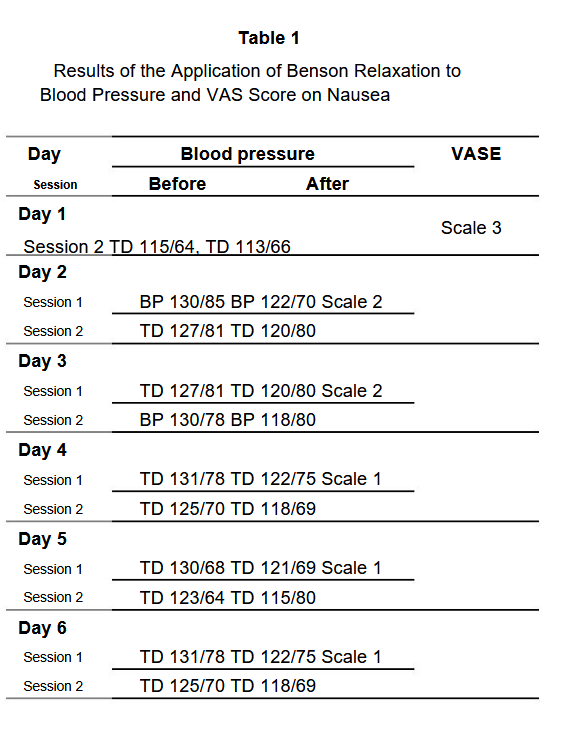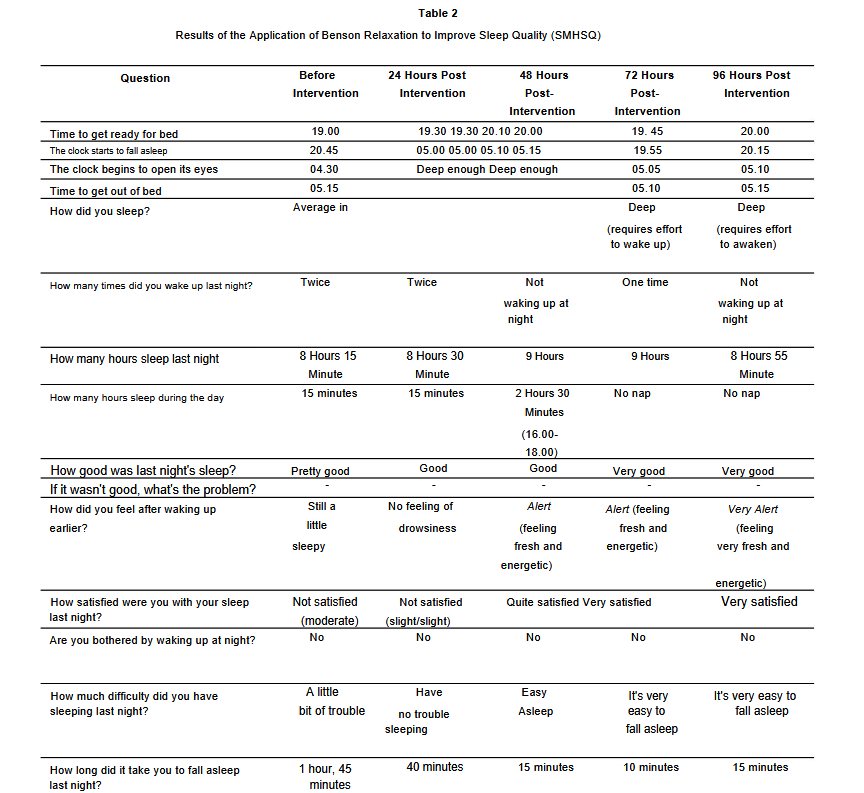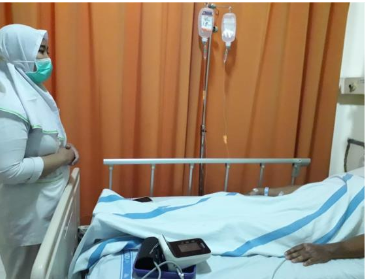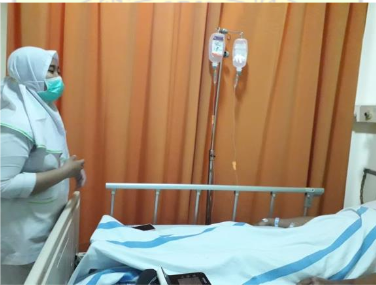International Journal of Integrative and Complementary Medicine
OPEN ACCESS | Volume 2 - Issue 1 - 2025
ISSN No: 2836-2810 | Journal DOI: 10.61148/IJICM
Inggil Ikhtiarani1, Tutty Aprianti2*
1Departement Of Nursing, Applied Bachelor of Nursing & Nursing Profession, Jakarta I Polytechnic of Health, Ministry of Health, Jakarta, Indonesia.
2Departement Of Nursing, Applied Bachelor of Nursing & Nursing Profession, Jakarta I Polytechnic of Health, Ministry of Health, Jakarta, Indonesia.
*Corresponding author: Tutty Aprianti, Departement Of Nursing, Applied Bachelor of Nursing & Nursing Profession, Jakarta I Polytechnic of Health, Ministry of Health, Jakarta, Indonesia.
Received: November 02, 2025 | Accepted: November 08, 2025 | Published: November 12, 2025
Citation: Ikhtiarani I, Aprianti T, (2025) “Application of Evidence-Based Nursing Practice Benson Relaxation in Cancer Patients Undergoing Chemotherapy to Reduce Nausea and Improve Sleep Quality: Case Report.” International Journal of Integrative and Complementary Medicine, 1(1). DOI: 10.61148/ 10.61148/IJICM/ 004.
Copyright: © 2025 Tutty Aprianti. This is an open access article distributed under the Creative Commons Attribution License, which permits unrestricted use, distribution, and reproduction in any medium, provided the original work is properly cited.
Abstract should include a brief content of the article. Please minimize the use of abbreviations and do not cite references in the abstract. This should state the objectives of the work, but should not contain a detailed summary of the results. Nasopharyngeal cancer is a type of malignancy that is common found cancer in Indonesia. One of the medical treatments for cancer is chemotherapy, the effects occur decreased sleep quality. An intervention reduce nausea and improve sleep quality in chemotherapy patients is Benson relaxation. This research aims to apply Evidence Based Nursing Practice Benson's relaxation to reduce nausea and improve sleep quality in cancer patients using "Effect of Benson's Relaxation Response on Sleep Quality and Anorexia in Cancer Patients Growing Chemotherapy: A Randomized Controlled Trial" as the main journal. This research is case report was conducted on one nasopharyngeal cancer patient who underwent Benson relaxation for 5 consecutive days, 2 sessions a day with a duration of 10 to 15 minutes. Results were obtained if the patient experienced a decrease in nausea and an increase in sleep quality as measured using VAS/NRS to measure nausea. and SMHSQ (ST Mary Hospital Sleep Questionnaire) to measure sleep quality in cancer patients. This article refers to another health workers to apply Benson relaxation to cancer patients with symptom of nausea, sleep disorders, anxiety and pain.
Abbreviations
1. SMHSQ (ST Mary Hospital Sleep Questionnaire)
Cancer, Chemotherapy, Nausea, Benson Relaxation, Sleep
The prevalence of nasopharyngeal cancer in Indonesia has 13,000 new cases found. Nasopharyngeal cancer is the most common cancer suffered by the ratio Women : Men = 2 : 4 and endemic areas exist on the island of Java. Nasopharyngeal cancer is one of the most common types of malignancy found and is in fourth place the most common cancer in Indonesia after cancer breast, cervical, and lung cancer (Decree of the Minister of Health of the Republic of Indonesia, 2019).
Medical management of cancer one of them is chemotherapy, one of them side effects of chemotherapy treatment can have an impact on the digestive system, such as the mucous membranes of the mouth, tongue, esophagus, stomach, intestines and up to the rectum. This can cause anorexia, loss of taste, reluctance to eat, erythema and ulcerative pain in the digestive tract, nausea, vomiting and diarrhea (LeMone, 2015).
Management that can be done to reduce nausea in cancer patients who underwent chemotherapy in the form of management nausea. One of several self-help interventions what nurses do is teach patients to use non-invasive techniques pharmacological to overcome nausea in the form of relaxation (PPNI, 2018). Relaxation Benson is a type of relaxation which can be applied to reduce nausea in cancer patients, as well as having many benefits such as improving peace of mind, sleep quality decreases anxiety and so on (Sari et al., 2020). Research conducted based on references main journal compiled by Harorani et al. (2020). This research was conducted at the hospital Iranian education on 84 cancer patients. Researchers suggest that Benson's relaxation can reduce nausea and improve sleep quality in cancer patients. Relaxation Benson here is a combination of deep breathing relaxation therapy and affirmations positive. This research compares between control and intervention groups, the results of the intervention group experienced a decrease nausea after being given Benson relaxation with a P value of 0.001 (Harorani et al., 2020).
Case reports
The method used is a report case or case report regarding the implementation of Benson's relaxation intervention for reduce nausea and improve quality sleep in cancer patients who are chemotherapy. Benson relaxation is combination of deep breathing relaxation therapy with positive affirmations applied in 5 consecutive days for 2 sessions 10 – 15 minutes (Harorani et al., 2020). Report This case was carried out in one of the one nasopharyngeal cancer patient undergoing chemotherapy at the Central General Hospital in South Jakarta namely Mr. G. Assessment of nausea using Visual Analogue Scale/ Numerical Rating Scale for assessing sleep quality using SMHSQ (ST Mary Hospital Sleep Questionnaire). SMHSQ is instruments specifically designed for assess the patient's sleep, testing the duration and quality of the previous night's sleep during they are in the hospital. The item ask about sleep problems, including latency, restlessness, insomnia, and morning alertness. This scale has 14 multiple-choice, short-answer items. It was first administered to four groups of people: surgical patients, others receiving medical care, others receiving psychiatric care, and finally to healthy volunteers. (Monterrosa et al, 2016). The assessment was carried out before intervention, after 24 hours, 48 hours, 72 hours and 96 hours post-intervention. Before and after Benson relaxation is carried out measurement of patient vital signs.


Results
Before the intervention, the patient said he felt he had not slept enough and woke up several times at night. Nausea what was felt when it was first inserted chemotherapy drugs on a scale of 7. Relaxation intervention Benson was applied to patients from day first chemotherapy cycle two. Results in application of Benson relaxation to decreased nausea and improved sleep quality as follows:
1. After Benson relaxation is performed on patients before and after intervention intervention there is a decrease in results measurement of vital signs.
2. After being applied for 5 days based on subjective patient data said nausea was much reduced compared to the first day it was done second cycle chemotherapy, participants said sleep felt good with feeling more refreshed when waking up, no woke up at night, slept at night for 8 hours and no trouble starting sleep.


Discussion Font: Cambria Size: 10
Patients with cancer are given several medical treatments, one of which is chemotherapy. Chemotherapy is a therapy pharmacological in the form of administering cytotoxic drugs which is inserted into the body. The purpose of chemotherapy is expected to kill cancer cells of the patient. In addition, chemotherapy also has several side effects, because apart from killing cancer cells, chemotherapy can also kill cells healthy body. Nausea and vomiting as well decreased sleep quality is one of the of the many side effects of chemotherapy treatment (American Cancer Society) Society, 2016; Firmana, 2017; Committee Ministry of Health's National Cancer Control Program RI, 2015).
In chemotherapy patients, nausea is a effects of chemotherapy drugs. Chemotherapy can stimulate the nausea center is in the brain, namely the chemoreceptor trigger zone (CTZ) through afferent nerve fibers located in the medulla oblongata. Next, the stimulus responded to through afferent nerve fibers in the nerves vagus and simultaneously the nausea and vomiting center vomiting provides an autonomic reflex stimulus and sympathetic reflexes that accompany nausea and vomiting, which is in the form of abdominal muscle contractions and diaphragm, peristaltic movement of the intestine, pharyngeal and gastric irritation, distension duodenum (stimulates dopamine receptors and serotonin in the gastrointestinal tract). So that it can be concluded that the process above involves some neurotransmitters and chemoreceptors (Gupta et al., 2021; Smeltzer & Bare, 2017). Nausea felt by the patient chemotherapy is given as a therapeutic management pharmacological and non-pharmacological therapy. Pharmacological therapy in the form of administration of antiemetic drugs works by blocking afferent signals (serotonin) which can cause nausea and vomiting especially in the gastrointestinal organs. Patients are given pre-medication before chemotherapy drugs were administered to the cancer room center in the form of ondansetron and dexa methasone. This is in accordance with articles that the author found (Herrstedt et al., 2022; Ryan, 2010). The patient said he still feel nauseous even though it has been given anti-nausea medication before chemotherapy drugs entered. Giving non-therapies pharmacologically, namely Benson relaxation aims to support or strengthen therapy pharmacological (prophylactic) which has been given with a focus on aspects client psychology, one of which is in the form of anxiety whose clinical manifestations are nauseous. Based on a literature review conducted by Nazari at.al (2023), the method Benson relaxation can improve the quality of life sleep, appetite, anxiety, and quality life. Therefore, the use of techniques Benson relaxation is recommended for improve health-related outcomes in cancer patients (Nazari at.al 2023).
Benson's relaxation method is wrong one of the easiest methods to learn and applied to patients. Relaxation methods Benson is performed by the patient it is recommended to sit in a comfortable position, close your eyes, relax everything muscles, starting from the feet to the face, breathe through the nose, done for 20 seconds minutes, and finally sat quietly for a few minutes, starting with your eyes closed and then with open eyes (Ibrahim, 2019). Benson's relaxation works by reducing anxiety through decreased muscle tension and expenditure cortisol, so that it can affect the heartbeat, breathing, and cardiac workload. Benson's relaxation regulates the hypothalamus as well as exert its effect by lowering stimulation of the sympathetic nervous system and stimulates the parasympathetic nervous system. Then Therefore Benson relaxation plays a positive role in improving sleep quality in patients by providing a sense of relaxation, reduce stress, and cortisol secretion (Sari et al., 2020). After applying Benson relaxation for five days with a time of 10 – 15 minutes, the results showed that the patient experienced a decline blood pressure measurement, pulse rate, and breathing frequency before and after Benson relaxation intervention was performed every the session. The patient said he felt better relax and calm until sleepy until almost fell asleep. The next day the patient said his body felt fresher after done Benson relaxation. Based on this, it can be concluded that conclusion that it happened improvement sleep quality in patients. This is in accordance with the results of research by Habibollahpour in 2019 showed an increase significant in the intervention group on sleep quality and including sleep quality subjective, sleep latency, sleep duration, and sleep efficiency, as well as daytime dysfunction increased significantly and there was significant differences between groups intervention and control in sleep quality including subjective sleep quality, sleep latency, sleep duration, and sleep efficiency habits after implementation of the intervention (Habibollahpour, 2019).
Acknowledgements
Thank you to Mr. G, the respondent of this research who was willing and gave his consent to this research. Thank you for Mam. Tutty Aprianti for her encouragement so that this research runs smoothly.